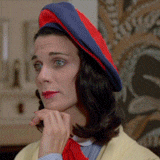|
I, like many a goon, love reading science fiction, and for obvious reasons science fiction is a perfect playground for every halfbit political theorist to theorycraft a utopian (or dystopian) future political system. I thought it'd be a fun discussion to explore some of the more interesting theoretical futures and reflect on how many of them are quite fascist. I'll get us started with a few examples! Robert Heinlein - Starship Troopers Heinlein is the proto-fascist origin story of a lot of contemporary military science fiction (coincidentally almost all published by Baen Books) which imagines a future in which the dominant political system is a quasi-libertarian/fascist state where military/public service is required to "earn" citizenship attendant privileges beyond a basic level of human rights. Here's a quick Wikipedia summary: quote:Set approximately 700 years from the present day,[20] the human society in Starship Troopers is ruled by the Terran Federation, a form of world government dominated by a military elite.[6] The society is depicted as affluent, and futuristic technology shown as coexisting with educational methods from the 20th century.[20] The rights of a full citizen, to vote and hold public office, are not universally guaranteed, but must be earned through Federal Service.[19] Those who do not perform this service, which usually takes the form of military service, retain the rights of free speech and assembly, but cannot vote or hold public office. People of either sex above the age of 18 are permitted to enlist. Those who leave before completing their service do not receive the vote.[20][33] Important government jobs are reserved for federal service veterans.[6] This structure arose ad hoc after the collapse of the "20th century Western democracies", driven in part by an inability to control crime and juvenile delinquency, particularly in North America, and a war between an alliance of the US, the UK and Russia against the "Chinese Hegemony".[34] So, pretty fascist, although Heinlein would probably refer to it as libertarian. Heinlein launched an entire generation of essentially fascist science fiction authors who love playing political theorist and decrying the crimes of liberalism and socialism, culminating in perhaps the nadir of science fiction, noted dipshit Tom Kratman. Kratman is well known for his transphobia and feuds with critics, but I had the displeasure of reading what is perhaps the worst science fiction novel ever, A Desert Called Peace, in which the UN, which controls Earth, colonizes a future planet which for Reasons follows the history of Earth up to 9/11. The main character (an obvious author stand in) loses his family in Space 9/11 and wages an extremely, shockingly racist revenge campaign against space Iraq. What's notable beyond an extended fantasy on how cool it is to kill Muslims, is that the real villain of the novel is the UN and "socialists", whose insistence on basic human rights leads to degeneracy and bad things. Oh, Kratman also wrote a novel in which the heroes are the Waffen SS. Hopefully people will share up write ups about their own favorite science fiction books!
|
|
|
|

|
| # ? Apr 18, 2024 02:29 |
|
I'll play along. Isaac Asimov - The systematic rejection of absolutes. Many science fiction authors take an idea to its logical extreme in order to make a point. Asimov fits right into that category. His novels almost all revolve around the idea of taking a seemingly absolute statement and then deconstructing it to expose how it does not hold up to scrutiny. Asimov's work, for the most part, paints the universe at large as rejecting one-size-fit-all solutions in all matters of policy and morality. As such, Asimov's view of the ideal future systematically revolves around the idea of local optimization, where each area has a set of rules appropriate to its local concerns and circumstances. The classic example of this is the famous three laws of robotics, which, despite being simple and seemingly foolproof on the surface, are always painted as fraught with problems, misinterpretation, and frankly more trouble than they are worth in the end. This becomes particularly clear when the line between humans and robots becomes extremely fuzzy in the later stories and novels The foundation series also follows the same pattern. What is presented at first like a rigorous plan by a future-predicting hyper-genius turned out to require multiple layers of fallbacks, one on top of the other, in order to stand any chance of working at all. The most extreme example of this is in the criminally underrated "The end of Eternity", where a centralized time-travel agency has taken upon itself to correct "mistakes" across all of humanity's accessible history, ranging from the late forties to the hundred-thousandth century, in order to maximize utilitarian value across the board. This ultimately dooms humanity.. The actual mechanical reasoning that lead to this being a bad thing are shaky at best, but the rejection of utilitarianism is no less blatant. Aramis fucked around with this message at 23:06 on Jan 19, 2021 |
|
|
|
bump
|
|
|
|
I was never much of a political person until our country's most recent decent into madness, so I rarely considered the political perspective of the media I consumed. There was a lot of Heinlein talk in the USPOL thread so I was surprised that no one mentioned "The Moon is a Harsh Mistress" which I enjoyed as a kid but apparently is some sort of revolting Libertarian fever dream. I expect that much of the 1960s and 1970s sci fi I read in my younger years probably had a laughable/repulsive political undertone that I didn't notice because I was reading for enjoyment, not enlightenment. EDIT: I should also mention that shows like The Twilight Zone and the original Star Trek gave my young mind the impression that human beings should avoid thinking that they can solve every problem with technology, or that modern human beings have moved beyond the ignorance and flaws of earlier times. I was not interested in "perfect" sci fi heroes. The cynicism and dystopia of the 1970s and 1980s definitely made sure I was not going to engage in America's usual hero worship bullshit. Dick Trauma fucked around with this message at 18:30 on Feb 11, 2021 |
|
|
|
Aruan posted:I, like many a goon, love reading science fiction, and for obvious reasons science fiction is a perfect playground for every halfbit political theorist to theorycraft a utopian (or dystopian) future political system. I thought it'd be a fun discussion to explore some of the more interesting theoretical futures and reflect on how many of them are quite fascist. drat you for posting what I was going to say about Kratman. Oh also never forget John Ringo who he coauthored the Waffen SS book with. That one had a postword where they talked about the evil Tranzies (Trans Nationalists) ruining America. Also it's funny how David Weber's own Honorverse actually has the original enemies be 'socialists'. He even, himself, explicitly stated that the People's Republic of Haven were explicitly meant to represent Welfare State America and were represented by being a Revolutionary France/Soviet Russia fusion after a couple of books. With villains creatively named Rob S. Pierre, St. Juste, and so on and also the ships having corrupt, brain-dead political officers called Commissars and everyone is forced to call each other Citizen. And then the final baddies is the Solarian League which is super explicitly the UN. Kchama fucked around with this message at 18:35 on Feb 11, 2021 |
|
|
|
 
|
|
|
|
Dick Trauma posted:I was never much of a political person until our country's most recent decent into madness, so I rarely considered the political perspective of the media I consumed. There was a lot of Heinlein talk in the USPOL thread so I was surprised that no one mentioned "The Moon is a Harsh Mistress" which I enjoyed as a kid but apparently is some sort of revolting Libertarian fever dream. I'll just say this: to deal with a shortage of women moon colonists, Heinlein's moon society has a group marriage system called "line marriage" which continually adds members as existing members age up and young people marry in. Since these family units never die, they can become quite wealthy, accumulating property over centuries thus the richest and most desirable ones to marry into stretch in a "line" back many generations. Due to the underlying gender imbalance, these marriages too tilt towards being sausagefests, therefore a woman can pretty much get in free, but a man who wants to marry in has to bring something to the table like money or property or best of all a hot girlfriend who will only marry in if he gets in too. Naturally the new sister-wife is required to gently caress all the men equally from her young hot boyfriend (if she brought one) up to the oldest creepiest Heinlein self-insert patriarch. If this sounds like a nearly-transparent gloss over legalized sex slavery, have i got a "well akshually something completely voluntary can't be slavery, if only the laws would catch up to my intellect" for you! VitalSigns fucked around with this message at 18:52 on Feb 11, 2021 |
|
|
|
Olaf Stapledon's 1937 novel Star Maker is basically an acid trip (or opium trip I guess since acid wasn't invented yet) interrupted by bits advocating for literal fully automated space communism. Also some eugenics, whoops. Stapledon was a socialist, a pacifist (except when it came to Nazis) and an internationalist and his beliefs bleed through all of his works.the preface to Star Maker posted:At a moment when Europe is in danger of a catastrophe worse than that of 1914 a book like this may be condemned as a distraction from the desperately urgent defence of civilization against modern barbarism.
|
|
|
|
Antifa Turkeesian posted:The decline of American hegemony and a multipolar future has been a fixation for Americans since the 70s, though. It wasn't Japan, but Americans have been obsessed with the idea that they would be culturally dominated in the same way they culturally dominated the rest of the world after World War II, and in a very deep, pathological way, since well before the end of the Cold War. Yes. Losing in Vietnam and then suffering through the fuel crises and stagflation made us realize our empire could and would decline like all others and created a great deal of social anxiety. The particular fear that Japan would come to dominate us culturally and economically, a reversal of how we had dominated Japan after 1945, was a major anxiety in the 80s, expressed in films ranging from Gremlins to Gung Ho. It became a big part of the cyberpunk milieu--see CP2077's main antagonists. And it turned out to be as accurate a prediction as datajacks and razorgirls. Zophar posted:I taught a Cyberpunk lit class last Spring and at each new step underscored how the genre was always much more about processing the present moment at the time of their creation, aligning the events of the novels/stories with the transitions in global social/economic paradigms that accompanied them. This applies to a great deal of science fiction, not just cyberpunk in particular. The Time Machine isn't about the wonders of time travel. It's an allegory about the dangers of Victorian class divisions. Spice in Dune stands in for oil. The Forever War is about the Vietnam War. More recently, Famous Men Who Never Lived is about being a refugee.
|
|
|
|
I wonder what peoples thoughts are on A Mote and God's Eye and the CoDominium universe.quote:The point of departure of Pournelle's history is the establishment of the CoDominium (CD), a political alliance and union between the United States of America and a revitalized Soviet Union. This union, achieved in the name of planetary stability, reigns over the Earth for over a hundred years. In that time, it achieves peace of a sort, as well as interstellar colonization, but at the price of a complete halt in both scientific and political evolution. Its an interesting twist in that it is founded on an alliance between the USSR/the US which creates kind of a quasi-UN body that functions to stifle technology amongst everyone else, and their key political opponents are nationalists. Of course when that fails it sets the stage for a Heinlein-esque Empire in the vein of Ancient Sparta (of course), but until then it does have an interesting setup.
|
|
|
|
Kchama posted:Also it's funny how David Weber's own Honorverse actually has the original enemies be 'socialists'. He even, himself, explicitly stated that the People's Republic of Haven were explicitly meant to represent Welfare State America and were represented by being a Revolutionary France/Soviet Russia fusion after a couple of books. With villains creatively named Rob S. Pierre, St. Juste, and so on and also the ships having corrupt, brain-dead political officers called Commissars and everyone is forced to call each other Citizen. Speaking of Weber/Honorverse, it always struck me just how terrible the antagonists are. Not "terrible" in the sense of "fearsome", but in the sense of "bad at everything they do". Their entire society and system of government is generally described as completely inferior. Even when we get a chapter from the point of view of an antagonist, it's just them mentally describing how much their own side sucks and how they only really fight for them out of some stoic sense of duty. Any plan of the antagonists usually fails quickly and immediately. When the much-hyped moment of the cold war going hot finally comes, their offensive fails completely and utterly across the whole front, mostly offscreen. From what I hear, that remains a pretty constant trend all the way to the end of the series (never read past book three or four). It's kind of emblematic of a lot of conservative wankfiction. They like the aesthetic of being the outmatched or oppressed underdog, but they're loathe to even entertain suffering any real consequences or defeat even in fiction.
|
|
|
|
Perestroika posted:Speaking of Weber/Honorverse, it always struck me just how terrible the antagonists are. Not "terrible" in the sense of "fearsome", but in the sense of "bad at everything they do". Their entire society and system of government is generally described as completely inferior. Even when we get a chapter from the point of view of an antagonist, it's just them mentally describing how much their own side sucks and how they only really fight for them out of some stoic sense of duty. Any plan of the antagonists usually fails quickly and immediately. When the much-hyped moment of the cold war going hot finally comes, their offensive fails completely and utterly across the whole front, mostly offscreen. From what I hear, that remains a pretty constant trend all the way to the end of the series (never read past book three or four). It's not just conservative wankfiction though. It's one of the fundament characteristic of reactionary Fascist ideology/propaganda.
|
|
|
|
i always felt that david weber wasn't as much a fascist as he is whatever you'd call someone who is obsessed with 1800s british naval culture (a man-o-waraboo?) who happened to write science fiction. for all his bizarre diatribes against socialism and for individualism, he never falls into the explicit fascism a la kratman or even ringo. he's conservative, but he doesn't walk the line (or leap past it) like many of his baen fellow authors. for more recent work, has anyone read Cry Pilot? its a great book (and the start of a great series), but sets up a much more modern twist on cyberpunk corporate dystopia and is one of the first better takes on that setting since neuromancer.
|
|
|
|
Science fiction that dosen't engage with politics is basically just fantasy for engineers
|
|
|
|
Perestroika posted:Speaking of Weber/Honorverse, it always struck me just how terrible the antagonists are. Not "terrible" in the sense of "fearsome", but in the sense of "bad at everything they do". Their entire society and system of government is generally described as completely inferior. Even when we get a chapter from the point of view of an antagonist, it's just them mentally describing how much their own side sucks and how they only really fight for them out of some stoic sense of duty. Any plan of the antagonists usually fails quickly and immediately. When the much-hyped moment of the cold war going hot finally comes, their offensive fails completely and utterly across the whole front, mostly offscreen. From what I hear, that remains a pretty constant trend all the way to the end of the series (never read past book three or four). It just gets worse and worse, in fact. The Solarian League is, in the first several books, touted as the series equivalent of God. It is why you do not use kinetic killstrikes on planets and the like, because the Solarian League enforces that rule and it has such a hegemony in everything that to go against it would be suicide and the only reason why Haven is in the game at all against Manticore is that the Solarian League sells them 10th-rate technology. Cut to the last few books when the series starts moving towards war with them. It soon turns out that they are actually centuries behind on technology and in fact their top of the line fleet with their best technology would get curb-stomped by Manticore's fleet at the start of the series. Their only hope is to literally drown Manticore in bodies and hope they run out of missiles first (Which they never do despite having all of their missile production capability destroyed and the smallest capship missiles at the start of the series costing 1 million for just the frame and drive and nothing else and Manticore's economy being destroyed and also them turning on their biggest trading partner in the universe) it turns out the SL has no money at all and can't actually afford to activate any ships.
|
|
|
|
Lawman 0 posted:Science fiction that dosen't engage with politics is basically just fantasy for engineers i take it you're not a big fan of k. j. parker
|
|
|
|
Aruan posted:i take it you're not a big fan of k. j. parker I have no clue who that is lol.
|
|
|
|
Aruan posted:I wonder what peoples thoughts are on A Mote and God's Eye and the CoDominium universe. I loved that book for the interesting and truly alien psychology of the, well, aliens and the anthropological (xenological??) puzzle of Motie society, and I kept getting annoyed at having to slog through the weird serf-mentality aristocracy-humping and Jerry Pournelle's iron age opinions about women (and you know that part was Pournelle because it was maximum-prude whereas a Niven society is maximally horny, too horny for normie males to even survive since Ringworld-novel humanoid females have pheromones or sexual kungfu moves or both that render men into temporarily mindless gently caress-zombies). And ya know humanity's key social advantage over the Moties being our ability to put female sexuality under tight male control so our population sizes don't get out of hand and destabilize society 
|
|
|
|
Aruan posted:i always felt that david weber wasn't as much a fascist as he is whatever you'd call someone who is obsessed with 1800s british naval culture (a man-o-waraboo?) who happened to write science fiction. for all his bizarre diatribes against socialism and for individualism, he never falls into the explicit fascism a la kratman or even ringo. Aramis posted:It's not just conservative wankfiction though. It's one of the fundament characteristic of reactionary Fascist ideology/propaganda. He's not explicitly fascist by virtue of not having actually had enough exposure to fascist ideology, but he's the type of conservative who becomes fascist the day the YouTube algorithm shows him the right videos. His writing has all the hallmarks. -Racial superiority politics -Hypernationalism -Good guys are alluded to possess a predestined grand fate -Anti-federal, pro-centralization, and explicitly pro-war economy -Enemies are simultaneously omnipresent and overpowering and also weak and cowardly, easily defeated by direct confrontation by The Right People -An actual secret conspiracy to racially extinct the good guys
|
|
|
|
Lawman 0 posted:I have no clue who that is lol. its a joke, k. j. parker writes fantasy, and literally wrote a series a called the 'engineer trilogy' where the main character is an engineering and its 25% about engineering and 75% about colonialism.
|
|
|
|
Lawman 0 posted:Science fiction that dosen't engage with politics is basically just fantasy for engineers To be fair, I'm fairly confident that Jules Vernes was extremely aware of that, and was perfectly comfortable with it. Edit: But seriously, The Mysterious Island is basically "Minecraft, the novel", and possibly the most blatant "Engineers stand above all other men" thing ever put to paper. Aramis fucked around with this message at 19:38 on Feb 11, 2021 |
|
|
|
Aramis posted:To be fair, I'm fairly confident that Jules Vernes was extremely aware of that, and was perfectly comfortable with it. Good point 
|
|
|
|
VitalSigns posted:I loved that book for the interesting and truly alien psychology of the, well, aliens and the anthropological (xenological??) puzzle of Motie society, and I kept getting annoyed at having to slog through the weird serf-mentality aristocracy-humping and Jerry Pournelle's iron age opinions about women (and you know that part was Pournelle because it was maximum-prude whereas a Niven society is maximally horny, too horny for normie males to even survive since Ringworld-novel humanoid females have pheromones or sexual kungfu moves or both that render men into temporarily mindless gently caress-zombies). have you ever ready 'oath of fealty'? its niven and pournelles stand alone novel about a functioning arcology in california, where the moral is 'its good if we allow corporations to become independent entities with the power to kill, because we can always trust them to be better than Incompetent Socialist Governments' and yea pournelle's terrible sexual politics only get worse in the rest of the Motie books. his solo series in the same universe - about Falkenberg's legion - is also an insane trip, because the central political thesis is heinlein's service guarantees citizenship but with way and '...and its ok to kill people who don't serve, because they're trash, and their deaths will lighten the burden on everyone else.' it feels like his ur inspiration is peak oil, or something similar, because the central concern in a lot of his works is scarcity, including mote in god's eye. i think its distinct from a lot of other authors in that they are more concerned with global war. Owlspiracy fucked around with this message at 19:37 on Feb 11, 2021 |
|
|
|
they also wrote 'lucifer's hammer' which is novel in the sense that it is one of the first post-apocalyptic novels about an asteroid hitting the earth, but also an insanely weird 80s scifi trip where the villians are black bikers who speak solely in some bizarre dialect and post-apocalypse immediately become cannibals, which Stains Their Soul
|
|
|
|
General question: are there any acclaimed science fiction authors who are not sex pests, crypto or otherwise? I used to be in a book club where all we read was award winning sci fi for two years and that was the common theme across all sub-genres, male and female authors, and from the fifties up to around 2010 or so.
|
|
|
|
The Oldest Man posted:General question: are there any acclaimed science fiction authors who are not sex pests, crypto or otherwise? I used to be in a book club where all we read was award winning sci fi for two years and that was the common theme across all sub-genres, male and female authors, and from the fifties up to around 2010 or so. most modern science fiction authors not published by baen are not sex pests or fascists. do you like military scifi, hard scifi, or what? if you like military scifi theres always marko kloos, who owns because he is happy to troll the rest of the genre.
|
|
|
|
I'll take any opportunity I can to recommend Kim Stanley Robinson. I'd grown entirely disenchanted with SF/F until I picked up his Mars trilogy. Along with Le Guin, he's one of the few authors that makes me feel some of the awe and wonder and hopefulness I did as a kid. His stuff gets derisively written off as "hard" sci-fi, which it is, but there's also a lot of heart and imagination in his stories. If you have any interest in SF/F and leftism, I can't recommend him enough. quote:These days I tend to think of dystopias as being fashionable, perhaps lazy, maybe even complacent, because one pleasure of reading them is cozying into the feeling that however bad our present moment is, it’s nowhere near as bad as the ones these poor characters are suffering through. Vicarious thrill of comfort as we witness/imagine/experience the heroic struggles of our afflicted protagonists—rinse and repeat. Is this catharsis? Possibly more like indulgence, and creation of a sense of comparative safety. A kind of late-capitalist, advanced-nation schadenfreude about those unfortunate fictional citizens whose lives have been trashed by our own political inaction. If this is right, dystopia is part of our all-encompassing hopelessness. https://communemag.com/dystopias-now/
|
|
|
|
The Oldest Man posted:General question: are there any acclaimed science fiction authors who are not sex pests, crypto or otherwise? I used to be in a book club where all we read was award winning sci fi for two years and that was the common theme across all sub-genres, male and female authors, and from the fifties up to around 2010 or so. Ursula K. Le Guin, Octavia Butler, C. J. Cherryh, Margaret Atwood James Tiptree Jr. wasn't a sex pest but she may have been a murderer 
|
|
|
|
Lester Shy posted:I'll take any opportunity I can to recommend Kim Stanley Robinson. I'd grown entirely disenchanted with SF/F until I picked up his Mars trilogy. Along with Le Guin, he's one of the few authors that makes me feel some of the awe and wonder and hopefulness I did as a kid. His stuff gets derisively written off as "hard" sci-fi, which it is, but there's also a lot of heart and imagination in his stories. If you have any interest in SF/F and leftism, I can't recommend him enough. If you haven't, you might want to check out Alastair Reynolds, particularly his post-Revelation Space stuff. Some people feel like he pushes a bit into performative wokeness, but I personally find it absolutely fine. Aramis fucked around with this message at 20:08 on Feb 11, 2021 |
|
|
|
Aruan posted:have you ever ready 'oath of fealty'? its niven and pournelles stand alone novel about a functioning arcology in california, where the moral is 'its good if we allow corporations to become independent entities with the power to kill, because we can always trust them to be better than Incompetent Socialist Governments' No I haven't read that. I've read a lot of Niven (although his later stuff seemed like a setting created by a good writer who gave it to a 14-year-old boy to fill in the details, probably a lot of that has to do with them all being about his obvious self-insert horndog protagonist Are the Mote sequels any good, it felt like the first story had a self-contained resolution and that the authors had already shot their whole load of solving the central mystery and conflict, so it seemed like any sequel would be Pournelle coming back like "oh and another thing about how women are the downfall of all societies everywhere  VitalSigns fucked around with this message at 20:14 on Feb 11, 2021 |
|
|
|
Aruan posted:most modern science fiction authors not published by baen are not sex pests or fascists. do you like military scifi, hard scifi, or what? if you like military scifi theres always marko kloos, who owns because he is happy to troll the rest of the genre. I've read a bunch of his work but I wouldn't call him acclaimed; the closest he came was when those right wing reactionaries nominated one of his books for a Hugo to try to get back at Ann Leckie and he withdrew from consideration. Youth Decay posted:Ursula K. Le Guin, Octavia Butler, C. J. Cherryh, Margaret Atwood Margaret Atwood is a good example. I haven't read enough of either le Guin or Butler to really feel like I have an idea of what they're like on this front (if anything), but the first book of CJ Cherryh's I read included the rape of a child and then went a tad too far on the "but the rapist meant well" front for me to give that a pass. Lester Shy posted:I'll take any opportunity I can to recommend Kim Stanley Robinson. At least this guy's bizarre sex content was all between consenting adults as far as I can remember.
|
|
|
|
for acclaimed, maybe william gibson? as far as i know there are no weird sex things in any of his work. there's also dan simmons, but, uh, don't read anything after 9/11 because 9/11 broke his brain. but hyperion is still one of the best scifi books ever written, and i like the sequels.
|
|
|
|
I'm really uncomfortable with just how much I liked Heinlein's books in high school and college. They are rife with mouthpiece characters in heroic protagonist roles, and frequently stop to lecture you about this cool thing they're so smart for thinking about. Late Heinlein is so loving creepy on reflection but the way he structures the books like, for instance, Time Enough for Love is like the frog in the pot brought to a boil. Only after the fact do you realize he led you to "... and that's why it's okay that he hosed his own mother". It's super hosed up.
|
|
|
|
The Oldest Man posted:At least this guy's bizarre sex content was all between consenting adults as far as I can remember. This somehow put back the memory of reading Dan Simmon's Olympos in my mind. Aramis fucked around with this message at 20:27 on Feb 11, 2021 |
|
|
|
Aramis posted:This somehow put back the memory of reading Dan Simmon's Olympos in my mind. I have mentally edited out so many weird sex scenes from sci fi novels that I actually don't trust myself to make recommendations to normies anymore which is partially why I asked this question in the first place. The other reason is that I think a major component of many science fiction writers' engagement with politics is envisioning a political order that makes the world a safe and/or mandatory place for their sexual fetishes. Heinlein for sure falls into this category.
|
|
|
|
lol i also forgot about that in olympus. yikes. i guess you could read leckie's ancillary justice series, but i find it unreadably bad, so :welp:
|
|
|
|
Nth Doctor posted:I'm really uncomfortable with just how much I liked Heinlein's books in high school and college. They are rife with mouthpiece characters in heroic protagonist roles, and frequently stop to lecture you about this cool thing they're so smart for thinking about. This just reminds me of OSC's stuff, where Ender's Game is VERY specifically written to take you down his specific morality path, but in his case he hosed it up and people just read it as more of a generic "YOU are a badass supermurderer at age 8 who is oppressed, reader."
|
|
|
|
orson scott card's earlier work before he went insane was pretty decent, particularly the Worthing Saga and A Planet Called Treason, but he's just been on perhaps the sharpest downward road to insanity amongst all working science fiction authors, including his "gay marriage is actually bad" campaign in 2012 and his atrocious rewriting of the book of mormon
|
|
|
|
Aruan posted:orson scott card's earlier work before he went insane was pretty decent, particularly the Worthing Saga and A Planet Called Treason, but he's just been on perhaps the sharpest downward road to insanity amongst all working science fiction authors, including his "gay marriage is actually bad" campaign in 2012 and his atrocious rewriting of the book of mormon Is Planet Called Treason the one where the villain is evil because the protag's dad raped her a lot?
|
|
|
|

|
| # ? Apr 18, 2024 02:29 |
|
My submission would be Iain M Bank's "Culture" books - a post scarcity, transhumanist society which is sorta governed by superintelligent AI's. I wouldn't say politics or ethics usually takes top billing (the stories tend to be more character driven) but you can definitely find some themes there. He writes well, many of the weirder aliens like the Affront, and the AI minds are particularly fun. Dick Trauma posted:I was never much of a political person until our country's most recent decent into madness, so I rarely considered the political perspective of the media I consumed. There was a lot of Heinlein talk in the USPOL thread so I was surprised that no one mentioned "The Moon is a Harsh Mistress" which I enjoyed as a kid but apparently is some sort of revolting Libertarian fever dream. Moon is a Harsh Mistress is definitely libertarian - I went back and listened to an audiobook at a boring desk job in college though and it was magical because the reader did the main character's narration with a Russian accent. I remember enjoying the narrative, but again, that was a very long time ago now. TBH the incest stuff that took front seat after his stroke is probably worse than his politics. Lawman 0 posted:Science fiction that dosen't engage with politics is basically just fantasy for engineers I am definitely going to steal this quote. Aruan posted:I, like many a goon, love reading science fiction, and for obvious reasons science fiction is a perfect playground for every halfbit political theorist to theorycraft a utopian (or dystopian) future political system. I thought it'd be a fun discussion to explore some of the more interesting theoretical futures and reflect on how many of them are quite fascist. Definitely fascist, but what part is libertarian? It's been half a lifetime since I last read Troopers, which was one of my favourite books growing up (not because of the politics - liked the narration style and way you could see Rico mature over the course of the novel), but I don't remember hearing much if anything about the economic system in the book. If anything it came off as "government controls everything". Now that I think about it, is fascism even compatible with libertarianism? I'm not saying either is good, mind you. Heinlein was in the Navy as a young man but was discharged due to medical reasons. I think some of the commentary I've read on Troopers suggests that it's partly him working through that, but also the bugs are a racist stand-in for the Communist hoardes. My relationship with Heinlein is complicated - never read him for the politics (or sex stuff) but he'll probably always have a place in my heart as one of the first authors I discovered as a kid and tried to read everything of. I actually didn't mind the politics of Troopers when I read it as "here's a scifi thought experiement" rather than "full facism now" - I actually do still think it's more the former than the latter just on the basis of how solidly libertarian the rest of his work is, but the fact it only shows the upside of it is rather damning. Lester Shy posted:I'll take any opportunity I can to recommend Kim Stanley Robinson. I'd grown entirely disenchanted with SF/F until I picked up his Mars trilogy. Along with Le Guin, he's one of the few authors that makes me feel some of the awe and wonder and hopefulness I did as a kid. His stuff gets derisively written off as "hard" sci-fi, which it is, but there's also a lot of heart and imagination in his stories. If you have any interest in SF/F and leftism, I can't recommend him enough. I haven't read them since high school and should go back - I remember the politics but not very clearly, the hard SF stuff I found very interesting at the time though. Red Mars was written very early in the 90s IIRC so it's got a bit of a retro-future thing with the Russians being a big player. (You can argue that they still sorta are, but if he was writing today I'm sure KSR would have swapped them with the Chinese to give the latter a more prominent role). Ethics_Gradient fucked around with this message at 20:55 on Feb 11, 2021 |
|
|























